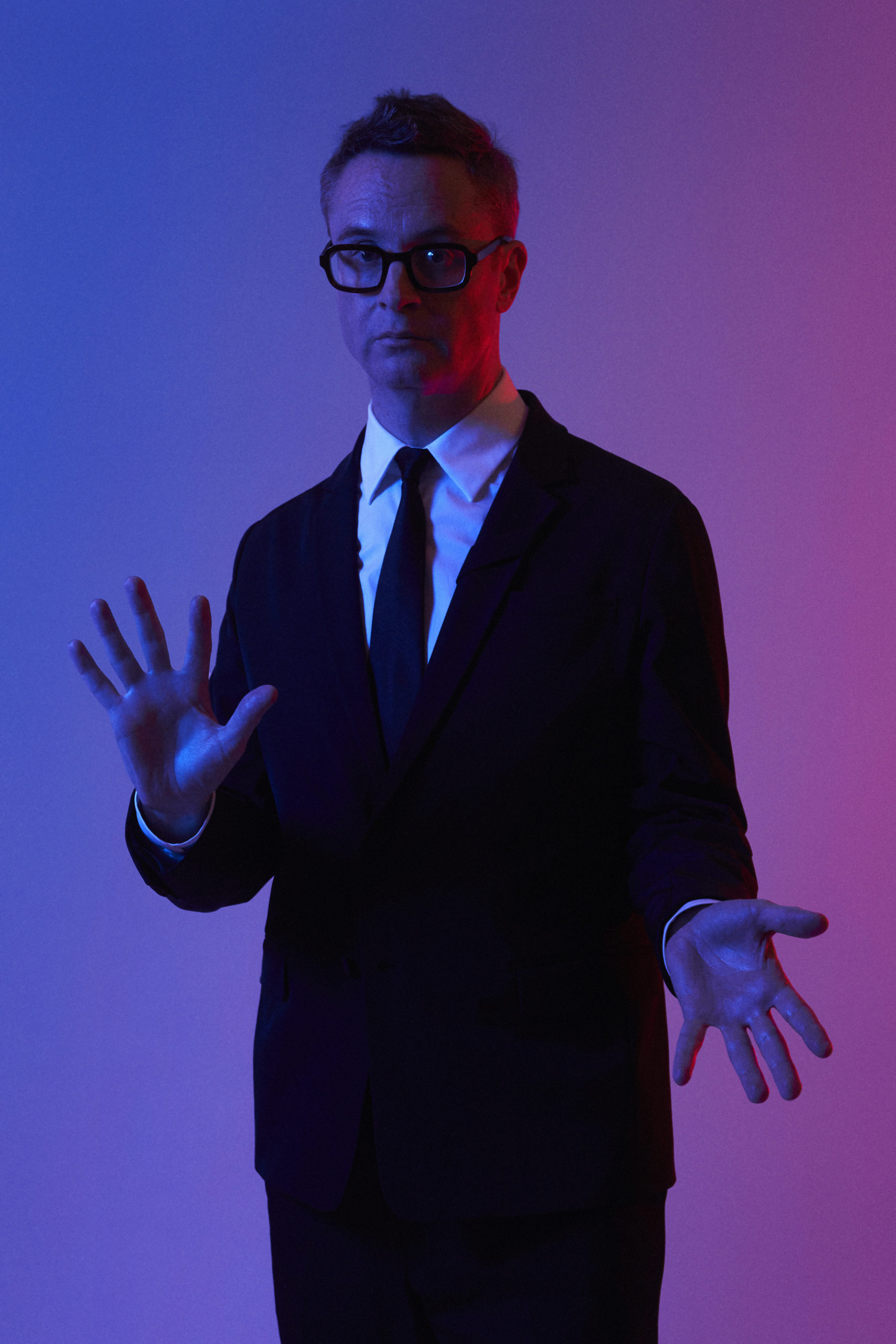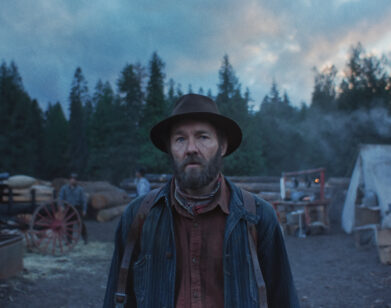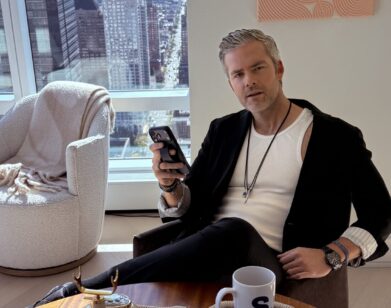GREAT DANE
“I’m Not a Politician”: Nicolas Winding Refn Aims to Polarize
Nicolas Winding Refn is a maverick. His name is synonymous with neon-drenched fables of revenge and honor soundtracked with hypnotic synthesisers. In an increasingly homogenous cultural landscape, Refn stands out as a true aesthete and iconoclast who’s able to balance commercial interests with artistic integrity in partnerships with Amazon and Netflix, who’ve produced his most recent long-form projects. Now, the great Dane is back with his first project since 2019’s Too Old to Die Young, one that is sure to prove as polarizing as the rest of his output since Drive, including the womb-foraging Only God Forgives and eyeball-eating Neon Demon. Copenhagen Cowboy stars Angela Bundalovic as Miu, a misfit-turned-avenging angel who takes an odyssey through the Danish underworld in search of her nemesis Rakel (played by Refn’s daughter Lola, in her screen debut) while coming to terms with the violence of her past. In a wide-ranging interview, the director talked about working with family, making art under capitalism, and his long-running fascination with vengeance.—SAM MOORE
———
SAM MOORE: So Copenhagen Cowboy—where did the idea come from?
NICOLAS WINDING REFN: Oh, wow. Well, I woke up one day and decided to make it.
MOORE: Had it been percolating for a long time?
WINDING REFN: Ideas can come from different surroundings. We had decided to stay in Denmark, regarding the pandemic, and everyone’s life was obviously changed. Being stuck and not having worked here for a long time, I decided that, well, maybe, now’s the time. So I just started thinking [about] what could be interesting to make and I came up with the title, first and foremost. From there, the idea flowed. In making these longer narratives, it’s very helpful to have a real team around you, so I created a writer’s room. I brought this concept and lead character and we started developing it. It was like a painting, not knowing where it’s gonna take you.
MOORE: So was it always envisioned as a six-hour, long-format show?
WINDING REFN: It was always looked upon as a streaming show. Netflix came very early to the development. They greenlit the show on a pitch. So that was obviously very supportive and encouraging. The theatrical experience has obviously gone through a very turbulent time in the last five years and with all these new mediums, there’s a collision of everything, because everything is digital. So either you embrace the future or you get lost in the past.
MOORE: How do you feel about streaming?
WINDING REFN: I don’t believe that either outweighs the other. On the contrary, the evolution just gives more opportunities. Personally, I still love the cathedral of the cinema, the idea that experiencing an event as a group is something enormously healthy. But it’s no longer the only way. Obviously, what’s moving with the speed of light is social media and telling stories through that. It’s almost like streaming has become old news. It was revolutionary five years ago but there’s already new formats taking over. The digital screen is the final destination for everything nowadays. It’s an inevitable evolution, but I don’t think anything is better than the other. I think of it as part of an opportunity.
MOORE: Your last project, Too Old to Die Young, was with Amazon. Copenhagen Cowboy is with Netflix. Are streaming companies more willing to take risks than the old Hollywood studios?
WINDING REFN: Well, it’s a difficult question to answer without stepping on anyone’s toes, but I will say that there is a reason why a huge percentage of young people are not engaging with today’s content. And I don’t think it’s because it’s good.
MOORE: How did you land upon Angela Bundalovic?
WINDING REFN: Sometimes with casting, you have to work the other way around: you’re not going to be able to find her but, instead, she’s going to reveal herself. And that will become the character. It was all old school street casting and suddenly, one day, she was there.
MOORE: Was that character always a woman?
WINDING REFN: Yes.
MOORE: Would Miu have been different if you’d have written the part as a man?
WINDING REFN: I don’t know. I’ve never thought about that. I’m not a politician.
MOORE: The show doesn’t directly address politics, in the sense of ideology or history, but it’s hard not to think it’s a commentary on feminism and misogyny.
WINDING REFN: Again, I’m not a politician. I think it’s more interesting to create and let it be interpreted because, most of the time, people react based on their own desires. And nowadays, everything becomes enormously polarized. There is no longer one perspective, there are now billions of perspectives and everything has the ability to be heard and validated. So, when you create something, at least in my situation, I don’t have an interest in it other than the idea that it creates. It’s an experience that creates opinions. I always say it’s very difficult to measure success because the financial ecosystem has really evolved. But I will say that a very simple way of defining success is achieving polarization. If you make something that people either love or hate, that is a reaction that is as truthful as you can possibly get.
MOORE: Since Drive, that has been largely the reaction to your work. Only God Forgives was very divisive, and so was The Neon Demon. Do you enjoy that?
WINDING REFN: I don’t set out with an agenda other than to represent, hopefully, the idea that if you create with your heart, it’s literally impossible for you to do anything wrong.
MOORE: Lots of people’s hearts are impure!
WINDING REFN: I think that, deep down, we are very aware of sincerity and insincerity. Interview started with a very sincere mission of counterculture. I grew up in New York and I met Andy Warhol when I was 15. So I think that people are very perceptive when it is artificial. But they’re also very reactionary when it’s not.
MOORE: What was it like meeting Andy as a teenager?
WINDING REFN: I was like 15, so I probably didn’t really care. I met him at a book signing with Divine. I was fortunate very early on, going to Danceteria and those kinds of clubs as a club kid. That’s what we were called: “club kids.” It was before AIDS and crack and the consequences of cocaine, which ruined everything in that world. It was before metal detectors, so I was very fortunate to get the last wave of the New York club scene. Me and a couple of my friends went to a Divine signing and Andy Warhol was there, so we met him.
MOORE: Copenhagen Cowboy lets women be as violent as men, which hasn’t always been the case in your work. Did you approach it any differently?
WINDING REFN: Not in my situation.
MOORE: We can all be as nasty as each other.
WINDING REFN: I think it’s human nature. I mean, just look around you.
MOORE: There’s a lot of darkness in the world. But you sound quite optimistic.
WINDING REFN: I think you have to be optimistic to wake up every morning and continue living. It’s very easy to give up. It’s very hard to smile.
MOORE: Are all men pigs?
WINDING REFN: By no means.
MOORE: Where did the idea for the pig squeals come from?
WINDING REFN: The idea of the pig itself is very mystical. Countries and cultures have different kinds of presentation of it as an animal. Denmark is certainly a very pig-oriented country. And that’s all we really have as our national presentation of wildlife. So, I thought of the idea of the pig being a kind of iconography that would help the show to underscore the idea of the cowboy, which is usually presented on a horse. But the pig is a very complex creature and obviously a very mythological creature. There’s a lot of fairy tales and mysticism around the pig and how it is actually connected to us humans and we now have pieces of pigs within us.
MOORE: You called Miu an evolution of characters like The Driver (Drive) and One Eye (Valhalla Rising). What did you mean by that?
WINDING REFN: They are based on the same DNA of the world needing a hero.
MOORE: A superhero in a traditional sense? Or a “Nic Refn” superhero?
WINDING REFN: Everything is Nic Refn, at least when I work. But obviously, on this, I was working with some wonderful female writers and listening to their wishes of what a female would represent nowadays, but also seeing what my kids are watching and seeing sometimes the lack of representation. And that is more confrontational.
MOORE: So you worked with women writers on this, and it’s no secret that your work has sometimes been called misogynistic. Did you set out to include women writers to rectify that?
WINDING REFN: No, they were just the best writers. I think words are used sometimes without fully understanding the meaning of them by a lot of people. We’re so easy to define based on superficial desires. But at the end of the day, I think there’s a lot more complexity to certain things.
MOORE: Does that criticism of your work bother you?
WINDING REFN: I couldn’t care less. It’s part of the reactionary polarisation. You’ll have some people say one thing and somebody else will say something opposite. And then you know you’ve done something correct.
MOORE: Why are you so fascinated by the idea of revenge?
WINDING REFN: Revenge is a great foundation for drama. Shakespeare’s best plays all feature revenge. It’s embedded in us. It’s suspenseful.
MOORE: You and I both love Tony Scott’s Man on Fire, which has a very pornographic sense of revenge.
WINDING REFN: I was a huge admirer of Tony Scott and I thought he was an absolutely fantastic filmmaker. His work was able to walk a tightrope in a very commercial medium while still being creative. I just thought it was a great film and the casting was terrific with Denzel Washington. It’s male porn in a sense in that it speaks to our deepest desires of finding pleasure in not just protecting but avenging innocence, which can be very seductive.
MOORE: Did you look to any other revenge films while making Copenhagen Cowboy?
WINDING REFN: There’s so many of them. I don’t think anything particularly comes to mind that I can think of. It’s a sub-genre in itself, but it’s also very human. I love John Wick. It’s all about taking revenge. There’s a simplicity to it in a way that is very seductive.
MOORE: Is that the kind of thing you’d like to make? Something that balances your aesthetic with more commercial interests?
WINDING REFN: I don’t believe that that really matters. If you go around worrying about that, you’re never gonna go anywhere. I prefer to look more towards the future. The definition of “commercial narrative” has kind of just imploded. You’ll have the traditional ecosystem of a box office or engagement on a streaming show, but the numbers are extremely low compared to somebody on social media that gets five million clicks within 10 seconds. I mean, it’s how you define success. It’s all being rewritten. I think that’s a healthy prospect. And I think the tools being handed to everyone to create are enormously refreshing.
MOORE: I imagine there were lots of overtures from Hollywood after Drive.
WINDING REFN: Everything leads to the desire of people wanting you, but they want you to do their thing, not to do your thing. I was just not really into giving up my freedom. The artist’s obligation is to be true to oneself and if you don’t have the power to decide your fate, then it can be very painful. But again, I’ve never really tried it any other way, so I don’t really know what I’m talking about.
MOORE: Of course, you did have discussions about Bond.
WINDING REFN: I think that when people sign on to do projects like that, it’s the same as when you sign on to do an advertisement. You’re there to be part of a team to create the best product and most effective product, but you have to leave your issues at the door.
MOORE: You do make advertisements, though.
WINDING REFN: Not really. I mean, for some years, I made a few. The ones I enjoyed were the ones where I was left alone. I do very much encourage my kids who are obviously moving into the industry to remember that they only have themselves at the end of the day. And if you don’t have your freedom, then just know what you’re up against.
MOORE: What was it like working with Lola on this?
WINDING REFN: It was very emotional. On one hand, I was a bit of a nervous wreck. But at the same time, it was great to work as a family. Having both my kids in the show at the end, and my wife being the foundation of most things that I do, it’s very rewarding.
MOORE: Did you find yourself directing her any differently?
WINDING REFN: No, it becomes very practical. Out of respect for them, you have to treat everyone equally.
MOORE: Is she going to pursue acting full-time now?
WINDING REFN: I think she’s from a generation where the idea of performance is part of an evolution. She’s from that generation that grew up with technology and the idea of social media and diverse opportunities. They look at the world in a different way and look at opportunities in a different way. That’s why I always find it ironic when people bring up things like theatrical versus streaming and what’s best because new formats have already taken over. The only real entertainment now in terms of mass entertainment is gaming. It’s the only component that continues to evolve and that’s because of technology. At the end of the day, a collective experience will always outweigh anything.
MOORE: What do great actors have in common with each other?
WINDING REFN: They all have something within them. It’s the same with Elle Fanning. Once the camera is turned on, they transport themselves into this artificial environment. It’s a gift you’re born with. You can’t learn. It can’t be taught. It’s god’s creation.
MOORE: I met Mads Mikkelsen a couple of weeks ago. He’s about the coolest person on the planet.
WINDING REFN: Mads is very cool.
MOORE: You’ve collaborated quite a bit.
WINDING REFN: I created Mads. We’ve always had that experience together. And the work we’ve done, it created a path for us that we both went on, obviously in different directions. But whenever we meet, we always have that in common. It can never be taken away from us.
MOORE: Pusher 2 is my favorite of your films and his performance in that is remarkable.
WINDING REFN: It’s his best performance, in my opinion.
MOORE: How did you guys get there?
WINDING REFN: It was all in the material. The script was written very quickly. I think Mads really related to the character on a deeper level. There was an authenticity to that. And also, he was up against real life, because everyone else came from that environment. He was the only professional actor. So it created a headspace that was very intense.
MOORE: Would you be interested in revisiting the Pusher films?
WINDING REFN: I told Netflix that I would but then I decided otherwise. I don’t think I could ever go back, because then I would just repeat myself. And what’s the point? Those films are what they are and are part of a certain time of cinema, a certain aesthetic. If I were to go back, then I feel that would be kind of sad.
MOORE: What compelled you to do the sequels, then?
WINDING REFN: I mean, I needed some dough. But sometimes, needing money is a great way to be creative.
MOORE: That’s a very American thing to say.
WINDING REFN: I think cinema is a commercial medium that’s foundation is capitalism. A lot of the European cinema in the last 40 years has been supported by government financing and tax schemes, but the nitty gritty of creating something with hard cash and having to benefit from it is obviously an American sensibility. Art is pure capitalism.
MOORE: That’s probably not a popular opinion in Denmark.
WINDING REFN: No, but that’s why I enjoy working with Netflix, which is an American institution with American commercial sensibilities. It is a lot easier and simpler, because it’s straight talk. If it makes money and works, the system works.
MOORE: You’ve called yourself a mummy’s boy before. Has your mom seen Only God Forgives?
WINDING REFN: My mother’s seen everything I’ve ever done.
MOORE: What did she make of it?
WINDING REFN: Everything I touch she says is genius.
MOORE: Which is the perfect mum answer.
WINDING REFN: She means it sincerely.
MOORE: You work very closely with your wife, Liv. Do you like that?
WINDING REFN: It’s not about if I like it, it’s just how it is. Once you take on the idea of marriage and creating a family, it’s the foundation of your life. I mean, it’s everything we live for. It’s memories we will have when we die. It’s how we as a family become more entangled in each other’s lives, rather than just being parents.
MOORE: That’s quite beautiful.
WINDING REFN: It certainly was very emotional for me. The first day on set, I was a nervous wreck. Because what if it didn’t work out? Thank god it did. You want your kids to thrive and become themselves in front of you.
MOORE: Did Lola audition?
WINDING REFN: Without knowing.
MOORE: How so?
WINDING REFN: That rebellious youth that the character was was a kind of mirror image of Lola. So I auditioned her by asking her if she could say these lines as I was writing them down just so I could hear them. That was her secret addition, she didn’t know about it. I said to her, “Can you please say these lines?” And she was like, “Why?” I’m like, “Can you just say them?” And she goes “Why?” again. And I’m like, “Just say the goddamn lines.” And she said them with such conviction and clarity and honestly, I was like, “Okay, that solves that.”
MOORE: Did it take any convincing for her to do the show?
WINDING REFN: No, she’s never really been interested in our lives professionally. So it was like, she may say no, but luckily she found it intriguing. She had exams at the same time. She was more preoccupied with that. For so many years in her school, I was the plumber. She didn’t want anyone to know who I was so she would tell their friends that her dad was a plumber.







